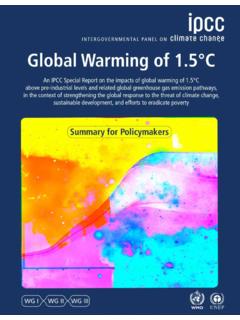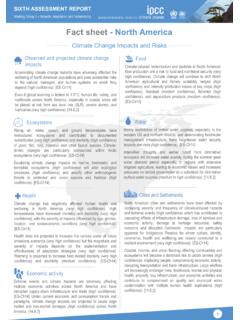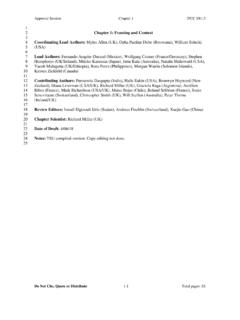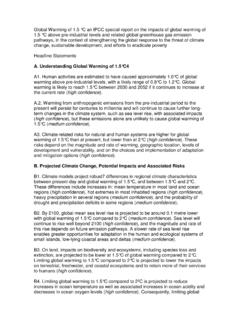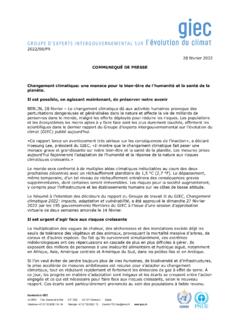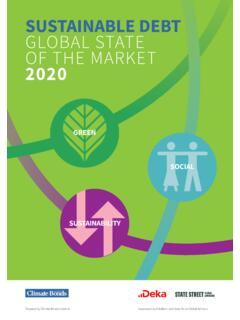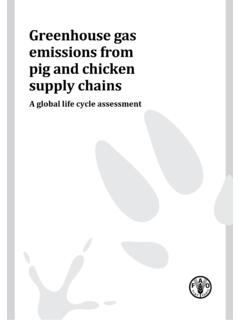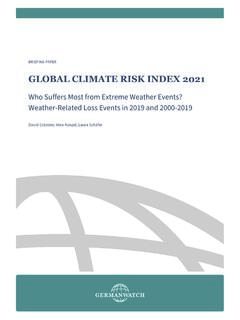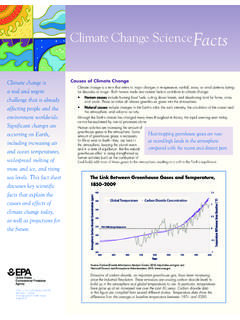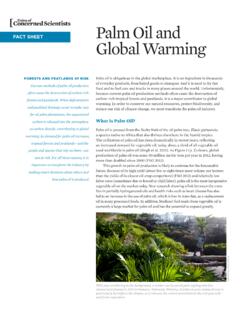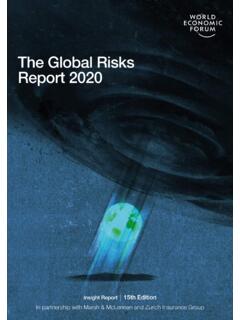Transcription of Global warming of 1.5°C - IPCC
1 Global warming of C. An IPCC Special Report on the impacts of Global warming of C. above pre-industrial levels and related Global greenhouse gas emission pathways, in the context of strengthening the Global response to the threat of climate change, sustainable development, and efforts to eradicate poverty Summary for Policymakers Edited by Val rie Masson-Delmotte Panmao Zhai Co-Chair Working Group I Co-Chair Working Group I. Hans-Otto P rtner Debra Roberts Co-Chair Working Group II Co-Chair Working Group II. Jim Skea Priyadarshi R. Shukla Co-Chair Working Group III Co-Chair Working Group III. Anna Pirani Wilfran Moufouma-Okia Clotilde P an Head of WGI TSU Head of Science Head of Operations Roz Pidcock Sarah Connors J. B. Robin Matthews Head of Communication Science Officer Science Officer Yang Chen Xiao Zhou Melissa I. Gomis Science Officer Science Assistant Graphics Officer Elisabeth Lonnoy Tom Maycock Melinda Tignor Tim Waterfield Project Assistant Science Editor Head of WGII TSU IT Officer Working Group I Technical Support Unit Front cover layout: Nigel Hawtin Front cover artwork: Time to Choose by Alisa Singer - - Intergovernmental Panel on climate Change.
2 The artwork was inspired by a graphic from the SPM (Figure ). 2018 Intergovernmental Panel on climate Change. Printed October 2018 by the IPCC, Switzerland. Electronic copies of this Summary for Policymakers are available from the IPCC website ISBN 978-92-9169-151-7. Introduction Chapter 2. Chapter 1 for Policymakers Summary 6. Summary for Policymakers Summary for Policymakers SPM SPM. SPM Summary for Policymakers Drafting Authors: Myles Allen (UK), Mustafa Babiker (Sudan), Yang Chen (China), Heleen de Coninck (Netherlands/EU), Sarah Connors (UK), Ren e van Diemen (Netherlands), Opha Pauline Dube (Botswana), Kristie L. Ebi (USA), Francois Engelbrecht (South Africa), Marion Ferrat (UK/France), James Ford (UK/Canada), Piers Forster (UK), Sabine Fuss (Germany), Tania Guill n Bola os (Germany/Nicaragua), Jordan Harold (UK), Ove Hoegh-Guldberg (Australia), Jean-Charles Hourcade (France), Daniel Huppmann (Austria), Daniela Jacob (Germany), Kejun Jiang (China), Tom Gabriel Johansen (Norway), Mikiko Kainuma (Japan), Kiane de Kleijne (Netherlands/EU), Elmar Kriegler (Germany), Debora Ley (Guatemala/Mexico), Diana Liverman (USA), Natalie Mahowald (USA), Val rie Masson-Delmotte (France), J.
3 B. Robin Matthews (UK), Richard Millar (UK), Katja Mintenbeck (Germany), Angela Morelli (Norway/Italy), Wilfran Moufouma-Okia (France/Congo), Luis Mundaca (Sweden/. Chile), Maike Nicolai (Germany), Chukwumerije Okereke (UK/Nigeria), Minal Pathak (India), Anthony Payne (UK), Roz Pidcock (UK), Anna Pirani (Italy), Elvira Poloczanska (UK/Australia), Hans-Otto P rtner (Germany), Aromar Revi (India), Keywan Riahi (Austria), Debra C. Roberts (South Africa), Joeri Rogelj (Austria/Belgium), Joyashree Roy (India), Sonia I. Seneviratne (Switzerland), Priyadarshi R. Shukla (India), James Skea (UK), Raphael Slade (UK), Drew Shindell (USA), Chandni Singh (India), William Solecki (USA), Linda Steg (Netherlands), Michael Taylor (Jamaica), Petra Tschakert (Australia/Austria), Henri Waisman (France), Rachel Warren (UK), Panmao Zhai (China), Kirsten Zickfeld (Canada).
4 This Summary for Policymakers should be cited as: IPCC, 2018: Summary for Policymakers. In: Global warming of C. An IPCC Special Report on the impacts of Global warming of C above pre-industrial levels and related Global greenhouse gas emission pathways, in the context of strengthening the Global response to the threat of climate change, sustainable development, and efforts to eradicate poverty [V. Masson-Delmotte, P. Zhai, H. O. P rtner, D. Roberts, J. Skea, P. R. Shukla, A. Pirani, W. Moufouma-Okia, C. P an, R. Pidcock, S. Connors, J. B. R. Matthews, Y. Chen, X. Zhou, M. I. Gomis, E. Lonnoy, T. Maycock, M. Tignor, T. Waterfield (eds.)]. World Meteorological Organization, Geneva, Switzerland, 32 pp. 3. Summary for Policymakers Acknowledgements We are very grateful for the expertise, rigour and dedication shown throughout by the volunteer Coordinating Lead Authors and Lead Authors, working across scientific disciplines in each chapter of the report, with essential help by the many Contributing SPM Authors.
5 The Review Editors have played a critical role in assisting the author teams and ensuring the integrity of the review process. We express our sincere appreciation to all the expert and government reviewers. A special thanks goes to the Chapter Scientists of this report who went above and beyond what was expected of them: Neville Ellis, Tania Guill n Bola os, Daniel Huppmann, Kiane de Kleijne, Richard Millar and Chandni Singh. We would also like to thank the three Intergovernmental Panel on climate Change (IPCC). Vice-Chairs Ko Barrett, Thelma Krug, and Youba Sokona as well as the members of the WGI, WGII and WGIII Bureaux for their assistance, guidance, and wisdom throughout the preparation of the Report: Amjad Abdulla, Edvin Aldrian, Carlo Carraro, Diriba Korecha Dadi, Fatima Driouech, Andreas Fischlin, Gregory Flato, Jan Fuglestvedt, Mark Howden, Nagmeldin G.
6 E. Mahmoud, Carlos Mendez, Joy Jacqueline Pereira, Ram n Pichs-Madruga, Andy Reisinger, Roberto S nchez Rodr guez, Sergey Semenov, Muhammad I. Tariq, Diana rge-Vorsatz, Carolina Vera, Pius Yanda, Noureddine Yassaa, and Taha Zatari. Our heartfelt thanks go to the hosts and organizers of the scoping meeting and the four Special Report on C Lead Author Meetings. We gratefully acknowledge the support from the host countries and institutions: World Meteorological Organization, Switzerland;. Ministry of Foreign Affairs, and the National Institute for Space Research (INPE), Brazil;. Met Office and the University of Exeter, the United Kingdom; Swedish Meteorological and Hydrological Institute (SMHI), Sweden; the Ministry of Environment Natural Resources Conservation and Tourism, the National climate Change Committee in the Department of Meteorological Services and the Botswana Global Environmental Change Committee at the University of Botswana, Botswana; and the government of the Republic of Korea.
7 The support provided by governments and institutions, as well as through contributions to the IPCC Trust Fund, is thankfully acknowledged as it enabled the participation of the author teams in the preparation of the Report. The efficient operation of the Working Group I. Technical Support Unit was made possible by the generous financial support provided by the government of France and administrative and information technology support from the Universit Paris Saclay (France), Institut Pierre Simon Laplace (IPSL) and the Laboratoire des Sciences du Climat et de l'Environnement (LSCE). We thank the Norwegian Environment Agency for supporting the preparation of the graphics for the Summary for Policymakers. We thank the UNEP Library, who supported authors throughout the drafting process by providing literature for the assessment. 4. Summary for Policymakers We would also like to thank Abdalah Mokssit, Secretary of the IPCC, and the staff of the IPCC Secretariat: Kerstin Stendahl, Jonathan Lynn, Sophie Schlingemann, Judith Ewa, Mxolisi Shongwe, Jesbin Baidya, Werani Zabula, Nina Peeva, Joelle Fernandez, Annie Courtin, Laura Biagioni and Oksana Ekzarho.
8 Thanks are due to Elhousseine Gouaini who served as the SPM. conference officer for the 48th Session of the IPCC. Finally, our particular appreciation goes to the Working Group Technical Support Units whose tireless dedication, professionalism and enthusiasm led the production of this Special Report. This report could not have been prepared without the commitment of members of the Working Group I Technical Support Unit, all new to the IPCC, who rose to the unprecedented Sixth Assessment Report challenge and were pivotal in all aspects of the preparation of the Report: Yang Chen, Sarah Connors, Melissa Gomis, Elisabeth Lonnoy, Robin Matthews, Wilfran Moufouma-Okia, Clotilde P an, Roz Pidcock, Anna Pirani, Nicholas Reay, Tim Waterfield, and Xiao Zhou. Our warmest thanks go to the collegial and collaborative support provided by Marlies Craig, Andrew Okem, Jan Petzold, Melinda Tignor and Nora Weyer from the WGII Technical Support Unit and Bhushan Kankal, Suvadip Neogi and Joana Portugal Pereira from the WGIII Technical Support Unit.
9 A special thanks goes to Kenny Coventry, Harmen Gudde, Irene Lorenzoni, and Stuart Jenkins for their support with the figures in the Summary for Policymakers, as well as Nigel Hawtin for graphical support of the Report. In addition, the following contributions are gratefully acknowledged: Jatinder Padda (copy edit), Melissa Dawes (copy edit), Marilyn Anderson (index), Vincent Gr goire (layout) and Sarah le Rouzic (intern). The Special Report website has been developed by Habitat 7, led by Jamie Herring, and the report content has been prepared and managed for the website by Nicholas Reay and Tim Waterfield. We gratefully acknowledge the UN Foundation for supporting the website development. 5. Summary for Policymakers Introduction This Report responds to the invitation for IPCC .. to provide a Special Report in 2018 on the impacts of Global warming of C.
10 Above pre-industrial levels and related Global greenhouse gas emission pathways' contained in the Decision of the 21st Conference of Parties of the United Nations Framework Convention on climate Change to adopt the Paris SPM. The IPCC accepted the invitation in April 2016, deciding to prepare this Special Report on the impacts of Global warming of C above pre-industrial levels and related Global greenhouse gas emission pathways, in the context of strengthening the Global response to the threat of climate change, sustainable development, and efforts to eradicate poverty. This Summary for Policymakers (SPM) presents the key findings of the Special Report, based on the assessment of the available scientific, technical and socio-economic literature2 relevant to Global warming of C and for the comparison between Global warming of C and 2 C above pre-industrial levels.
